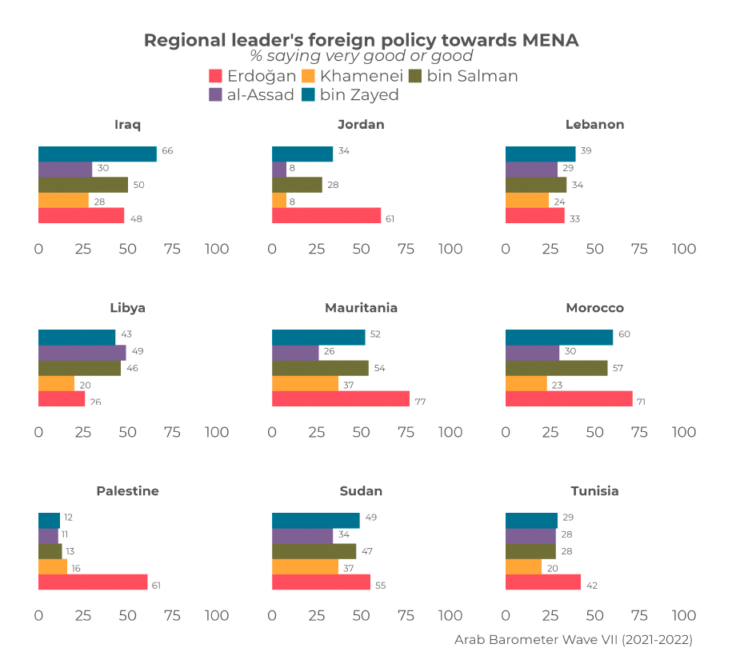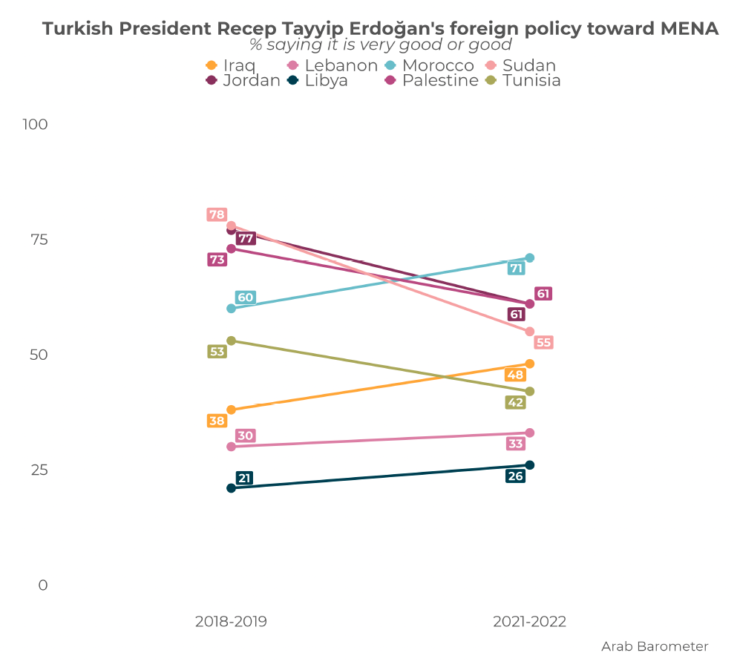Over the last decade, there has been an ongoing competition for leadership within the Middle East and North Africa. Some have described this as a new Arab Cold War, with an anti-Iran and anti-Islamist block led by Saudi Arabia and the United Arab Emirates on one side with a more pro-Iran and pro-Islamist bloc led by Turkey and Qatar on the other. In recent years, the sharp divisions have lessened, with the end of the Saudi-led blockade against Qatar and improving relations between Ankara and Riyadh.
To understand how citizens across the Middle East and North Africa view this competition, Arab Barometer included a number of questions about the leaders of the respective blocs. As the results of this new survey make clear, Turkish president Recep Tayyip Erdogan is the most well thought of leader among citizens in countries surveyed by Arab Barometer. In six out of nine countries, Erdogan has the highest support of any leader while in two of the three remaining countries, he is in the top three.

Yet, despite his relative overall popularity, trend attitudes towards Erdogan are not as positive. Compared to Arab Barometer’s fifth wave in 2018-2019, Erdogan’s popularity significantly decreased in half the cases Arab Barometer surveyed. Approval of his foreign policy towards MENA dropped 23 points in Sudan, 16 points in Jordan, 12 points in Palestine, and 11 points in Tunisia. In Lebanon, a country with some of the lowest levels of support for Erdogan, there were no meaningful changes in attitudes.

While Erdogan’s popularity is the highest overall, his regional rivals Saudi Crown Prince Mohammed bin Salman and Emirati Crown Prince Mohammed bin Zayed are the next most popular. Bin Salman and bin Zayed’s popularity are often statistically equal, but bin Zayed tends to be slightly more favored. Bin Zayed is the most popular leader in two of the three countries that did not favor Erdogan (Iraq and Lebanon). The leaders’ shared approval may reflect their own close ties. The two have long been united in their foreign policy goals, particularly with respect to countering Iran and suppressing Islamist movements across the region. In all countries surveyed except Iraq, ratings of the two leaders fall within 6 points of each other. Overall, 66 percent of Iraqi citizens say bin Zayed’s policies are “good” or “very good”, compared to bin Salman’s 50 percent.
Of the five regional leaders Arab Barometer asked citizens to evaluate, Syrian President Bashar al-Assad and Iranian Supreme Leader Ali Khamenei typically are the least popular. Assad tends to be more popular than Khamenei, however. Only in Palestine (16 percent versus 11 percent) and Mauritania (37 percent versus 26 percent) is Khamenei significantly more popular than Assad. In recent years, Iran has focused building relationships with African countries, which has included starting bilateral talks with Mauritania. Meanwhile, Assad notably comes in as the most popular regional leader in Libya with 49 percent of Libyans saying his policies are “good” or “very good.” In Tunisia, Assad’s approval (28 percent) is tied with that of bin Salman (28 percent) and bin Zayed (29 percent).
Domestic policies in foreign leaders’ respective countries likely affect citizens’ perceptions of these leaders. The significant drops in Erdogan’s popularity across the region come at a time when Turkey is losing its fight to keep inflation under control. Turkey’s financial crisis hit new levels in June with inflation topping 78 percent according to Turkish estimates. The foreign reserves of Turkey’s central bank have dropped perilously low, causing Erdogan to work towards normalizing relations with his longtime rivals and next most popular leaders, Mohammed bin Salman and Mohammed bin Zayed. If Erdogan is successful in his bid to establish warmer relations with bin Salman and bin Zayed, it is possible that their new détente will affect the leaders’ popularity among Arab citizens in the future.
In only three countries did support for Erdogan rise significantly since Arab Barometer surveyed the region in 2018 and 2019: Morocco (11 point increase), Iraq (10-point increase) and Libya (5-point increase). The support for Erdogan in each of these countries is likely tied directly to Turkish policy toward each country. For example, Moroccans’ support for Erdogan can easily be linked to Erdogan’s repeated public support of Morocco’s claim on the Western Sahara.
In Libya, Turkey has intervened directly in the ongoing civil conflict. Many have called for the removal of Turkish forces, which is likely linked with the low level of overall popularity. However, the increase in support for Erdogan is found entirely due to increasing support in the West of the country. Turkish soldiers have played a vital role helping establish control for the UN backed government. Overall, 31 percent of Libyans who live in the West say Erdogan’s policies are “very good” or “good” compared to only 18 percent of Libyans in the South, and 13 percent of Libyans in the East.
A similar regional story can be seen in Iraq. In the Iraqi government-controlled regions of the country, 51 percent of Iraqis support Erdogan compared to only 17 percent of Iraqis in Kurdish regions. This is unsurprising, as Erdogan vehemently opposes the creation of any Kurdish state.
Arab Barometer does not yet have trend data on the favorability of Mohammed bin Salman and Mohammed bin Zayed. The relatively high popularity of Erdogan, bin Salman, and bin Zayed implies that the MENA citizen does not follow the leaders’ own Cold War. The effects of the three leaders’ new-found allyship on their favorability among citizens remains to be seen.



